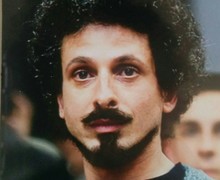Interview with Denis Roio (Jaromil)
Algorithmic Sovereignty and the state of community-driven open source development. Is there a radical interface pedagogy for algorithmic governementality?

Denis Roio (Jaromil) will give a talk about Algorithmic Sovereignty and the state of community-driven open source development. Is there a radical interface pedagogy for algorithmic governementality? at FOSDEM 2019.
Q: Could you briefly introduce yourself?
I’m 41 years old and a hacker from the BBS times, loved programming all my life (started on a C64, then Amiga as a demo scener); I do love literature and humanities and became a scholar in philosophy of technology.
I’m very happy today I can do the work I love: writing free and open source software for Dyne.org. Once upon a time I was into audio/video DSP but nowadays applied cryptography (especialy EC) makes my day.
My favorite shell is Zsh, my favorite languages are C and some LISP dialects, my favorite philosopher is Michel Foucault, my favorite music genre is Jazz and of course my favorite distro is Devuan :^)
Q: What will your talk be about, exactly? Why this topic?
I’ll be talking about Algorithmic Sovereignty, which is also the topic of my doctoral dissertation, as well that of many valuable researches for which the website AlgoSov.org serves as a good summary.
The topic is pretty important today, I believe, since technology is evolving at a very rapid pace and towards rather incommensurable complexity - ever heard the “innovation” magic word? ;^) - and that makes participants (all users and developers and sysadmins) less in control of what is happening.
Q: What do you hope to accomplish by giving this talk? What do you expect?
I will be exploring various aspects of this scenario, not just to understand who is in control of present and future technology, but also what are the impacts on our personal and professional lives, and how can we overcome this trend and envision ways of development that are still bottom up, inclusive and community based.
I expect the audience to react to this talk in a creative way and wonder around the foundational principles that have started communities as the FOSDEM one itself.
Q: What was your breakthrough insight that algorithms have power over us?
The narrative of free and open source software is foundational to this awareness, but to quote a recent example the episode of Pokemon Go was really a splash. That’s why I love the artwork by Pawel Kuczynski which is shown on the AlgoSov.org website.
I explore the topic more in depth in an interview made more than a year ago, but still very actual I believe.
Q: Users of free and open source software enjoy the benefit of transparency of algorithms, but is that enough for algorithmic sovereignty? And How can non-developers influence an algorithm?
This is an important question that helps me make my point. I believe that the transparency of algorithms is not enough of a condition to establish the sovereignty of participants adopting them. As we see software governing more and more the way we live (with trends as smart cities, internet of things, social networks, etc.) we need to go beyond the licensing model of software and look at its purpose and most important at what ways partipants are offered in order to influence and adapt the system to their needs and desires.
People who are not fluent in programming languages can still help a lot this process, since developers alone are hardly able to contemplate and understand human needs when their software is in action.
Q: What are some practical examples of things that FOSS developers can do to improve algorithmic sovereignty?
I believe the UNIX philosophy gives us many hints on how to, from the perspective of software design: lower complexity, do one thing and do it well, make software easily interoperable, agree on common protocols, avoid lock-in scenarios, etc. are all design approaches which also improve security.
Last but not least: design for awareness. Make people aware of what happens, in a simple way (that’s a challenge!), rather than hide complexity.
Q: At the end of 2017, you released the first version of Dowse, a system that lets you understand what devices are doing on your home network and can turn their internet access off. Are there any new developments in Dowse?
Sure! I’ve summarised some developments that are still in the works in an interview.
We have been running workshops all over the world also with art and design students, the last ones were in Taipei and Huangzhou, fantastic experiences — and interesting to see Dowse work in dire network situations.
The project has also inspired several researchers in the field of ethics and in particular was prominently featured as good practice by the Virt-EU project on “Values and Ethics in Innovation for Responsible Technology in Europe”.
Q: Have you enjoyed previous FOSDEM editions?
Absolutely yes, FOSDEM and FSCONS are my favorite free software conferences. FOSDEM is bigger and therefore a bit disorienting, but I really enjoy talking to any perfect stranger finding out we have tons of things in common and a lot of arguments to debate fervently, even beyond the Emacs and Vim debacle :^) Try starting a conversation about shells or programming languages anywhere and within minutes you’ll find the debate has grown into a whole circle of people where everyone has an opinion :^D I love that.

Creative Commons License
This interview is licensed under a Creative Commons Attribution 2.0 Belgium License.